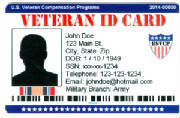|
|
|
|
|
|
Scammers
Posing As Gov't Officials March 9, 2016
So called government imposters are at it again, using the FTC’s name to try to con veterans into paying them for some service or product. Whether it’s to clean up your credit report, give you a prize, resolve a complaint against you, or pay off a debt you owe to the government, the scammers have created convincing lies to con veterans out of their money. The message may be a call or an email, but it isn’t from the Federal Trade Commission (FTC), or any other federal agency, even though it may look “official.” Here’s the key to recognizing the con: If someone claiming to be a government employee asks you to send money to collect a prize or remove negative information from your credit report, don’t do it. And don’t give them your personal or financial information.
Sophisticated Scam Targets Disabled Veterans
& Vets Applying for Disability Compensation A highly sophisticated scam targeting veterans is making its way around the United States. This new scam is targeting disabled veterans and the veterans applying for disability compensation. This highly sophisticated scam makes use of new telephone technology that gives the impression the scammer is actually calling from a veterans’ local VA Regional Office.
Here’s How it Works The caller pretends he/she is a VA official from the veterans nearby VA Regional Office. The caller, pretending to be a rating official, or claims specialist, informs the veteran that he/she has been awarded 100 percent disability rating as a result of military service-connected disabilities. Then, the scammer will ask the veteran for a bank account number to which the scammer claims to initiate monies owed to the veteran and will be automatically deposited into their account. How Do Scammers Get Information? The scammer is fully aware of the veterans full name, address at the time of the call, military branch served, dates of service, all making the guise seem plausible. Granted, such information is easily accessible through various public records. Additionally, anyone who is computer literate is able to obtain a large volume of information about almost anyone from Internet resources, including names of family members and dates of birth. Also, new technology allows for anyone with the proper software to get even more information on individuals simply by inputting their driver’s license into the right software. Fortunately, the scammer does not possess information available to the VA on any application for disability. Therefore, information such as a social security number, type of disability, or primary care physician is not available to the scammer. This scam seems to work particularly well on veterans who have applied for VA disability or veterans working on getting an increase in compensation. When a scammer informs you that $75,000 worth of back pay will soon be deposited into your bank account, many veterans simply become irrational thinkers, and fall prey to this scam. Where Are Scammers Hitting Pay Dirt? Veterans living in areas with large veteran populations appear to be extremely vulnerable to this scam. Also, veterans who use VA facilities appear vulnerable as well.
How to Avoid Scam
If you have a valid VA claim, you know the VA agent with whom you filed your claim. You also have claim paperwork signed by an authorized representative of the Veterans Administration. These are the folks with whom you should have contact.
|
|
|
|
|
|
|

